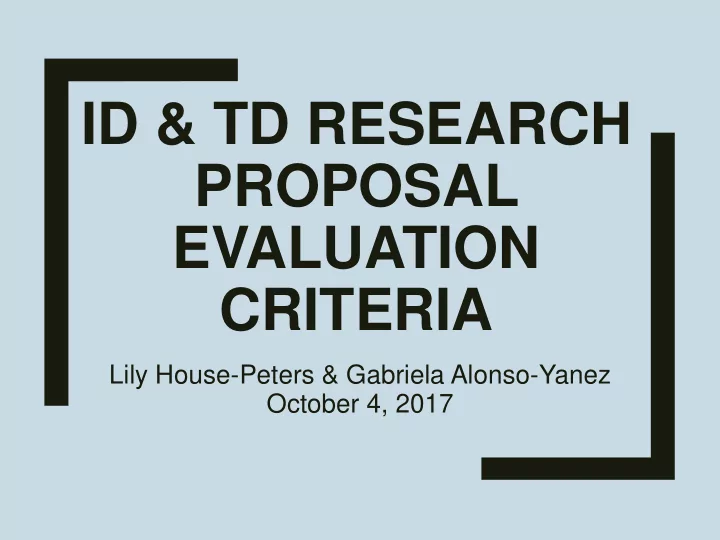

ID & TD RESEARCH PROPOSAL EVALUATION CRITERIA Lily House-Peters & Gabriela Alonso-Yanez October 4, 2017
Overarching Evaluation Questions Does the research proposal successfully and effectively: 1. Integrate its disciplinary components, so that it generates an emergent whole, 2. Address an interdisciplinary research question, or program of questions, and 3. Produce outcomes that are demonstrably greater than the sum of its (disciplinary) parts? Source: McLeish T and McLeish V (2016) Evaluating interdisciplinary research: the elephant in the peer- reviewers’ room. Palgrave Communications. 2:16055 doi: 10.1057/palcomms.2016.55. (https://www.nature.com/articles/palcomms201655)
Components of Integration The co-generation of research questions and project design (Belcher et al., 2015); The compatibility of epistemologies (Klein, 2008); Mutual learning and language-acquisition within teams (Marzano et al., 2006); High-level responsibilities for managing and nurturing internal communication (Marzano et al., 2006); Development of interdisciplinary skills (Strang and McLeish, 2015); Shared methodologies and interpretations (Callard and Fitzgerald, 2015); The creation of common ground (Repko and Szostak, 2012); Combination of research results at high levels (Somerville and Rapport, 2000)
1. Presence & Integration of Multidisciplinary Expertise Overarching Question: Do the disciplines do more than work in parallel but interact, communicate, and recombine? Guiding Questions: ■ Is the proposal introduction clearly describing an inclusion of perspectives in ways that create interesting linkages? ■ Does the proposal clearly articulate interesting linkages that speak to a gap in current understanding of the given topic or problem? ■ Does the proposal offer evidence of disciplinary “problem spaces” where scientists from different disciplines integrate their perspectives and expertise? Source: Pennington, D., Bammer, G., Danielson, A., Gosselin, D., Gouvea, J., Habron, G., ... & Wei, C. (2016). The EMBeRS project: employing model-based reasoning in socio-environmental synthesis. Journal of Environmental Studies and Sciences , 6 (2), 278-286.
2. Methodology Overarching Question: Is there a unifying principle, theory, or set of questions that provides coherence? Guiding Questions: ■ Do the processes for cohering the different data in the research, (quantitative and qualitative) recognize the need for translation where this is necessary? ■ Have the different methods and approaches – and communication between them – been recognized in the structure of the research? Source: Klein JT. 2005. Guiding questions for integration. Proceedings of the Integration Symposium 2004 . Canberra: Land & Water Australia. CD-ROM #EC040735. land&waterAustralia lwa.gov.au.
3. Project Management, Timeline & Budget Overarching Question: How is the collaboration organized? Guiding Questions: ■ Does the proposal include evidence of a leadership structure characterized by inclusivity, facilitation, transparency of roles, and an equality of contributing disciplines in terms of voice and status? ■ Are there ways of supporting the social cohesion of the collaborators? ■ Are additional resources and time planned for dialogue, co- learning, and integration between the contributing disciplines? Source: Repko, A. 2011. Interdisciplinary Research: Process and Theory . Sage Publications.
4. Project Outputs, Outcomes & Broader Impacts Overarching Question: Is it clear how interdisciplinarity and transdisciplinarity will be reflected in the project outputs and outcomes? Guiding Questions: ■ Are the overall goals of the project conducive to generating significant novel investigations that will advance science and policy? ■ Are project outcomes designed to offer ‘knowledge extension’ outcomes — requiring teams to synthetize scientific findings or products into usable knowledge for non-scientific groups? ■ Are project outcomes designed to offer knowledge application’ outcomes — requiring teams to translate findings into solutions to ground-level problems within the region where the project is located? Source: Alonso-Yanez, G., L. House-Peters, J. Pittman, M.G. Cartegena, M. Farfan, S. Bonelli, and I. Lorenzo. (In preparation). Exploring factors that facilitate collaboration for action-oriented socio-environmental science to confront global change in the Americas. Environmental Management .
Recommend
More recommend